- Home
- Maggie O'Farrell
This Must Be the Place Page 7
This Must Be the Place Read online
Page 7
But the nurse walks through the room without glancing at them and disappears into the corridor.
Niall feels his eyes fill, feels the burn take hold. His hands spring upright of their own accord and begin to tear at his neck in a sawing motion, back and forth, across the skin of his throat. The feel of it is an exquisite, forbidden, torturing release. Yes, he tells himself, you are scratching, you are, even though you shouldn’t, but how good it is, how amazing, but how dreadful it will be when he stops, if he stops, if he can ever end it.
Next to him, he can hear his father searching his pockets for something, lotion or spray, whatever he can reach first. Then he is putting his hands over Niall’s, getting his fingers between Niall’s nails and his neck, but Niall is not letting go, not permitting him entry, he cannot stop, he cannot, his neck is clasped by a ring of fire, a dementing ruby necklace, and he must tear it off or scratch down, until there is nothing left of his skin, until he reaches bone and sinew and maybe then, only then, will the itching stop.
His father has forgotten the posters. Niall feels this. His father is holding him tight. Niall can smell his aftershave, feel the soft blue of his shirt. It is half embrace, half armlock. His father is getting control of his arms, his hands, forcing his fingers down. Niall can feel this happening and he is strong, he knows, especially when the itch is upon him, but his father is stronger. Niall is fighting, kicking, struggling. He can hear a voice somewhere, crying, no, no, let me go, get off me. His father is saying, it’s OK, it’s OK, over and over, into his hair, and at the same time he is manhandling Niall across the room, kicking open the door to the treatment ward and calling out: can somebody help us, please, my son needs to be seen, he can’t take it, he can’t take it a minute longer, please, can somebody help him?
The noiseless shoes of the nurses come running.
Niall walks with the stiff-legged gait21 that must be adopted when all your joints are pasted, gauzed, padded. He moves along the treatment ward – the nurses all smile at him, say hello. When he was small, his mother used to bring him, just the two of them, and when Phoebe was born, she would come too and Niall would push her up and down the corridors in her stroller until it was time to be seen. Now Phoebe is at grade school, she can’t come any more. This makes her stamp her foot: when Niall comes home in his wrappings she will take one look at him and wail, why didn’t you take me to the clinic, I love the clinic, why can’t I go? His mother doesn’t come any more either because she’s gone back to work.22
Niall wanders through the ward, past the nurses’ station and into the room with UV treatment units, where there aren’t usually many people. If he can pass enough time before returning to the waiting room, his father might decide it’s not worth going back to school for the rest of the day. He might take him to the space and science centre, where they can walk the halls together, stand under the pinpricked dome of the planetarium, and Niall can tip back his head to look up, far up, into space, safe inside his wrappings.
Niall takes a couple of rides in the elevator. He loiters for a while in the corridor. He wanders past the UV machines, watching people turn blue under the lights. He visits the drinks machine but remembers he doesn’t have any money in his pockets so makes do with the water fountain. When he thinks it’s about time to find his dad, he makes his way back to the waiting room and is just about to turn into the open door, when he hears a voice say, ‘I do like your artwork.’
Niall pulls himself up short, stepping behind the door. He knows that voice, he’s sure. It’s a woman who comes, as they do, on a Wednesday afternoon, with her teenaged daughter. She wears pantsuits, her hair arranged over one shoulder, and shoes that clip on the clinic lino. She always engages Niall’s dad in conversation and sometimes Niall wants to say, can’t you see he’s working, he’s grading papers, leave him alone.
‘For the sake of argument,’23 his father’s voice comes out as a slow rumble – he’s probably concentrating on his reading, ‘who says it’s mine?’
The woman again: ‘How would you know what I’m talking about, unless it was you?’
‘Who says I know what you’re talking about?’
‘I saw you look at the wall when I said artwork –’
‘What wall?’
‘– which proves it was you.’
A short silence. Niall can picture his father giving the woman his piercing, amused stare. ‘It does?’
Niall gazes at a display of leaflets. Advice about sun protection for sensitive skins. Anti-bacterial lotions. How to cope with facial dressings.
‘So,’ the woman beyond the door persists, ‘where’s your son?’
‘In there.’
‘He went in on his own?’
His father must have nodded because there is a gap. Then the woman says, ‘Listen, I’m not giving you a hard time about the posters. I just wish I’d thought of it. Who wants to see an advert for eczema products featuring children with flawless fucking skin and—’
‘Not me.’
‘Not you. Or me. Or any of us. Bravo,’ she says, ‘that’s what I say.’
Fucking. The word presses into Niall’s mind, like a thumbtack. Kids at school say it. A teacher sent someone home last week for shouting it at recess. He has never heard adults say it to each other like this, casually, thrown out, as part of a normal sentence. The silence beyond the door swells like dough in an oven, until Niall can bear it no longer and steps into the doorway, into the room. His father says, ‘There you are.’ The woman’s head snaps round so that she can look at him and could it be said she had been leaning close to his father, a little bit too close?
‘Hi!’ says the woman, baring her teeth at Niall. ‘You’re looking very comfy and cosy there.’
Niall plants himself in front of his father. ‘Let’s go,’ he says.
His father glances at him, glances at the woman, then starts to shuffle everything into his briefcase: papers, pens, journals. He hands Niall his jacket, helps him on with it because it can be hard to insert a bandaged arm into a sleeve, his father knows this. Niall picks up the gyroscope from the table; it doesn’t fit in his pocket so he carries it carefully in his hand. Then he and his father are trailing themselves and their possessions across the floor, and they are about to leave, they are almost safe, when the woman leaps up, comes after them, takes his father’s arm.
‘Your glasses,’ she says, and she is holding them out to him, their frail legs crossed over each other.
Niall looks at her and feels the pressure of her touch on his own arm, as if he and his father are neurologically interchangeable. He watches as his father turns, thanks her, accepts the glasses, which he is always forgetting,24 and Niall sees that there is a small piece of folded paper tucked into them. Lined, yellow paper,25 a kind that his father never uses. He sees his father seeing it but pretending not to. The glasses are slid into the breast pocket of his jacket with a few more thanks, and then they leave.
Niall doesn’t know it but there is something about this moment that will imprint itself on his mind: the geometric shapes of sunlight in the unit waiting room, angling themselves over chair arms and table-tops, his father turning from him towards the woman, the woman’s voice saying, your glasses, the piece of yellow paper that his father accepted then hid, the hard edges of the gyroscope pressing into his fingerpads through the meshing of his gloves. In a matter of months, the unbelievable will have happened and his father will have disappeared from his life and he won’t see him again for many years, his mother will say terrible things about his father, and Niall and his sister Phoebe will listen to these things and believe them, yet not believe them, all at the same time. Either way, his father will be gone, the house will be as if he was never there, and sometimes Niall will lie awake and wonder if he’d imagined his father, dreamt him up. Had he ever been there at all? Then he will think about the day his father produced a gyroscope from his pocket and they set it going together, on the table in the Paediatric Acute Dermatology Daycare Unit and it s
pun, a perfection of balance, of poise, sending points of light streaming over the walls.26
It’s Really Very Simple
Phoebe, Fremont, California, 2010
I’m under the bleachers with the rest of the crowd from eleventh grade and they have a glass tube filled with something and it’s bubbling away, with a kind of animal roar, and some of them are taking it in turns to inhale it and the air is wreathed with its chemical stench and I’m pretty sure it’s not weed, and I’m not sure what it is but don’t want to ask, and I’m regretting wearing the skirt I bought with Casey at the weekend. It’s kind of short, a slippery fabric, and I’m having trouble keeping it so my underwear doesn’t show. I’m wishing I’d worn cut-offs, like Casey, instead of this skirt.
You can hear the yells and whistles from football practice out on the field and the grind of cars from the road. I like the way, under here, the people up on the bleachers look like shadows as they walk up and down the steps. Shadows without bodies attached to them. Kind of like Peter Pan but the other way round.
I want to point this out to Casey but she would raise her thinned brows and roll her amber eyes and say something like, God, Phoebe Sullivan, you are so weird.
Stella would have totally got it. She would have flopped onto her back, looked up and said something like, yeah, in that drawn-out way she has.
I’m tugging down on my hem and I’m aware that Mike Lepris has been edging his way over to me for a while now. He has the glass tube in one hand and the lighter in the other. I know he likes me – his friend Carlos told Diane who told Casey who told me – but his eyebrows are kind of shaggy and his right thumbnail is really long and pointed, like the claw of a carnivore. I told Casey this and she said, Phoebe, he plays guitar, like that was supposed to explain everything.
I look over at Casey and see that she is leaning forward and she has the hem of Chris’s T-shirt in her fingers. She yanks on it then lets go, giving a peal of laughter, and I hear Stella’s voice in my head, all deadpan: if she had a dancecard, she’d be hiding behind it, saying, tush and fie.
I don’t know why I’m thinking of Stella all of a sudden and why I’m feeling so strange. Like I’ve been cut down the middle and I’m in two places at once, or I’m getting radio interference from somewhere, or I’m just a shadow, like the people up there watching the game, and the real me has gone off somewhere on its own. Dissociation, my brother said, that time when I told him I get like this sometimes. Dissociation is the word.
Mike Lepris is next to me now and Chris has his index finger resting on the frayed ends of Casey’s cut-offs and her face is all innocent, like, nothing’s going on here, but I can see her looking around, can see the strain of it, of what might be about to happen, in the corners of her mouth, in the creases under her eyes. She looks kind of like our cat does when she’s pretending she’s not about to jump up and lick the butter dish but you know she totally is.
It was only when I started this grade that Casey Trent and her lot started smiling at me in the corridors and saying hi. Me and Stella had been best friends since first grade and had always hung out together, and then suddenly I didn’t see her any more because I was sitting on a lunch table with Casey, and Casey always had so many people around her that I couldn’t see where Stella was so I couldn’t invite her to sit down with us. I sort of lost track of her. Mom said she came over to our house a couple of times, looking for me, but I was out with Casey, at the mall or under the bleachers, and then she stopped coming, stopped calling. I see her sometimes, the back of her, with that old red backpack of hers, in the corridors, but we don’t speak any more. She sits two rows in front of me in Spanish but she doesn’t turn around, doesn’t meet my eye. I noticed the other day she no longer wears the friendship bracelet I made her.
I don’t really know what changed or when it happened. I used to be skinny. I used to wear jeans and loose shirts; Stella and I bought the same ones, mine with blue stripes, hers with yellow. Tits are so overrated, Stella told me, when we went to the pool. We stood in the cubicle together and she put her hands under her boobs and pushed them up and together so that she looked like she was in one of those costume dramas. They just get in the way, she said. Here comes Pancake Sullivan, Mike Lepris shouted at me in math once. Was that really only two years ago? And then, last summer, pretty much overnight, my boobs just grew. Two hillocks, heavy as water, appeared on the front of my ribcage.
Have you stuffed your bra? my mom said to me one morning, her eyes narrow, the way they are when she’s caught me out in a lie. When I said, no, my face all red, she looked at me hard, looked at my chest. Well, Christ, she said eventually, find something to put those in, you can’t have them hanging around like that.
It was Stella who took me to the store. A lady with a tape measure took me into a changing room and said not to be embarrassed. Stella talked Polish to her while I tried on bras. A week later, school started and that was when I lost sight of Stella.
I’m jolted out of my thoughts by Mike Lepris. He’s putting the hard glass mouth of the tube against my lips, his arm encircling my shoulders, and holding the lighter to the bulb. The tube bubbles furiously, emitting smoke like a dragon and I turn my head away. I want to say, I don’t do this, I haven’t done this, but somehow there isn’t time and I’m sure that some of the smoke has found its way into me, through the cave of my mouth and down my throat, where it stings and burns. I push it away, coughing, and Mike, next to me, is laughing and his arm is still around my shoulders and then his mouth is on my neck and his lips feel wet and rubbery, he is printing spitty ellipses on my skin, and I know he expects me to turn my head towards his so he and I can get started, and I know I probably should because, let’s face it, I’m nearly seventeen and that’s really too old not to have done this before, but I think about his pointed thumbnail and his heavy eyebrows that look as though they’ve been scribbled on his face with marker pen and him saying Pancake Sullivan all that time ago, and Casey and Chris, with his fingers by her cut-offs’ hem and her hair that she winds into curlers every night, and then suddenly I’m up, I’m upright, and my skirt swishes down, as if relieved to be reacquainted with gravity, and I’m swinging my bag onto my shoulder and I’m walking away, towards the exit of the bleachers, and then I’m out in the sunlight again, away from that striped half-light, and they’re calling me, some of them are laughing, Mike Lepris is shouting something, not Pancake Sullivan, not that, and Casey is calling my name, but I keep on walking.
It seems as if the side of my head is missing. I can feel air whistling through my skull, like a draught. I have to put up my hand to check it’s still there. It is. I touch my cheekbone, my hair, the shell-whorl of my ear. It’s the strangest feeling. I tip my head one way, then the other, then stop because I’m worried my brain might roll out and fall on the ground with a splat.
I pass a boy I vaguely recognise and he is standing outside the gym door, spinning a basketball on one skinny brown finger. He’s just there, in a slant of sun, a ball poised and balanced in motion. He’s doing it for no reason other than that he wants to and he’s good at it. I stop and watch the ball rotate and it doesn’t appear to be connected to his hand and it seems like the most amazing thing I’ve ever seen so I laugh and give him a clap. He turns and looks at me, surprised, and I know it’s because I’m judged to be one of the popular girls now, one of the untouchables, and I shouldn’t really be acknowledging him. By rights, I should just walk by him as if he isn’t there. Hey, Phoebe Sullivan, he says, and raises his hand and lowers it, showing off now, but he doesn’t drop the ball. I want to say, how do you know my name, but I smile at him and walk on.
In the parking lot, I see someone who looks like Stella. She’s wearing one of the overall things that she and I always used to buy if we found them in vintage stores and I’d forgotten the thrill of seeing one on the rails. Some of them have a name badge on the lapel and it seemed like the funniest thing to us to wear overalls with a name that wasn’t ours. I remember
finding one that said ‘Randy’ and we nearly got thrown out of the changing rooms because we were laughing so hard.
It is Stella, without a doubt. She has the overall arms tied around her waist, a red blouse on the top, the way I used to wear them. She’s dyed the tips of her hair a bright, jumping blue and I can see it from a long way off. She’s standing at the bottom of the school steps, talking to some boy, and this seems like the best coincidence ever. I set my course towards her. I’m going to say, Stel, where have you been, how could I lose you, let’s walk together, do you want to come back to mine?
Then I realise it’s my brother she’s talking to. Niall is standing in the parking lot, arms crossed in front of him, car keys hooked on a finger. His hair stands up from his head, just like it always does, as if he’s recently been electrocuted. I want to spread my arms wide and run towards them. My two most favourite people in the world, ever, here, in front of me.
As I approach, I see Stella turn her head and clock my presence. She turns back to Niall and I know what she’s saying: Gotta go.
It’s what she says at the end of every phone call, every day, every conversation, every lesson. Gotta go. You can spend the whole day with Stella, wound up in a long, meandering chat and then, with two short words, it’s over and she’s gone. I used to tease her about it. You’re about to say ‘Gotta go’, aren’t you? I’d go to her. Yep, she’d say, gotta go. And then she’d be gone. Over and out.
So Stella looks up at my brother – she’s still only five foot two, even in her thick-soled boots, my Eastern European babushka genes, she used to say – says it, gotta go, and she wheels away, without another glance in my direction.
Niall pushes his glasses up on his nose and pats the skin of his inner arm, which is what he does when he gets the urge to scratch.
‘What are you doing here?’ I call out to him.

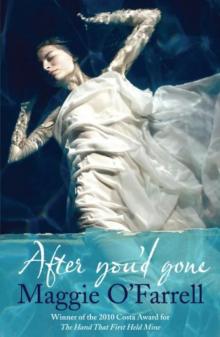 After You'd Gone
After You'd Gone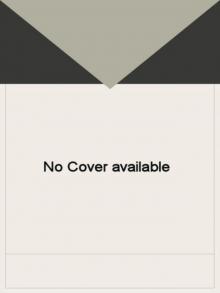 The Hand That First Held Mine
The Hand That First Held Mine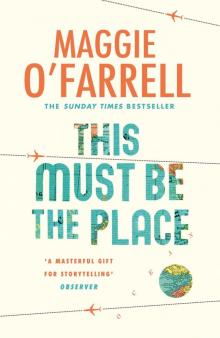 This Must Be the Place
This Must Be the Place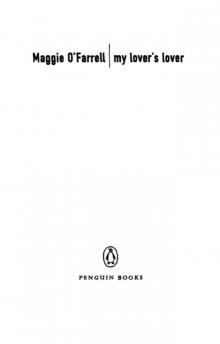 My Lover's Lover
My Lover's Lover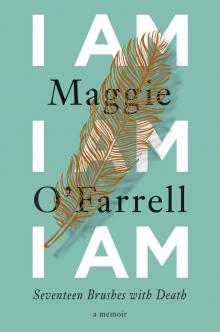 I Am, I Am, I Am: Seventeen Brushes With Death
I Am, I Am, I Am: Seventeen Brushes With Death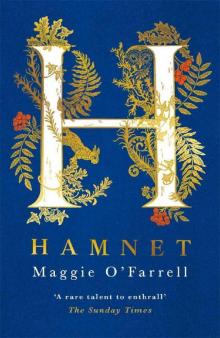 Hamnet
Hamnet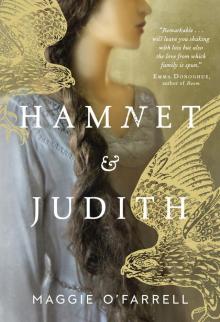 Hamnet and Judith
Hamnet and Judith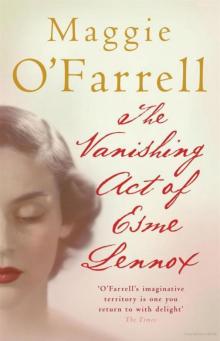 The Vanishing Act of Esme Lennox
The Vanishing Act of Esme Lennox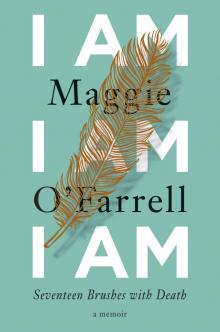 I Am, I Am, I Am
I Am, I Am, I Am